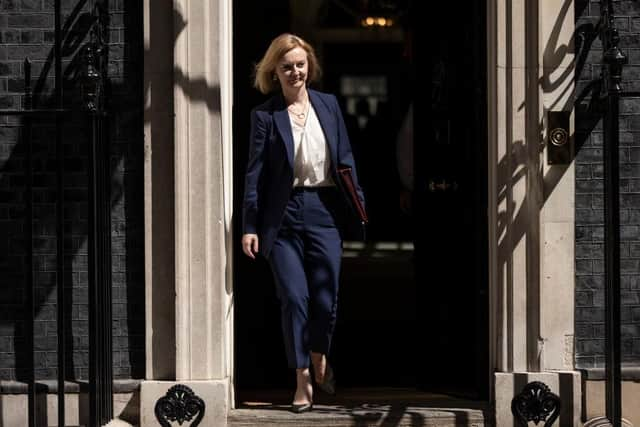Brexit trade deals: Liz Truss admission confirms fantasy of easy agreement with US – Martyn McLaughlin
As the UK Government set out its negotiating objectives for a free trade agreement with the US, its biggest trade partner by far, she envisaged major victories for British industry, and Britain plc. The UK economy, she said, stood to benefit from a £3.4 billion boost, with the trade deal increasing transatlantic trade flows by a staggering £15.3bn.
“Striking ambitious free trade agreements with our partners around the world is one of the key opportunities of Britain becoming an independent trading nation once again,” Ms Truss announced. “This deal with our biggest single trading partner will cut red tape for our small businesses, cut tariffs for our great products from dairy to cars and increase growth in all four nations.”
Advertisement
Hide AdAdvertisement
Hide AdCar manufacturers, food and drink producers, and professional services, such as architects and lawyers, Ms Truss continued, would be among the biggest winners from tariff free access to the lucrative US market.


Well, it now turns out she was right. Up to a point, anyway. The UK Government has thrown significant sums of money at legal firms, public relations firms, and other agencies – hundreds of thousands of pounds in 2020 alone, by my count – in an attempt to secure a post-Brexit trade deal.
In news that will shock precisely no one, it has all been to no avail. Ms Truss has now admitted what has long been obvious for some time: there is precious little chance of any such deal being struck for years to come.
Speaking to reporters as she flew to New York for her first bilateral meeting with President Joe Biden, the Prime Minister conceded that talks were unlikely to start in the “medium term”, with her focus firmly on issues relating to global security.
“There aren’t currently any negotiations taking place with the US, and I don’t have any expectation that those are going to start in the short to medium term,” Ms Truss explained.
If you are wondering what an admission of failure looks like, minus any admission of responsibility, Ms Truss’s remarks are a masterclass.
None of this should come as any great surprise, given the UK Government’s legislative efforts, spearheaded by the new Prime Minister, to abandon parts of the Northern Ireland Protocol in a way that breaches international law.
Washington has repeatedly warned that any such unilateral moves risked undermining the Good Friday Agreement. Ms Truss is making attempts to separate the two issues, but it is wishful thinking on her part.
Advertisement
Hide AdAdvertisement
Hide AdWhat is left is a gaping hole in her government’s post-Brexit trade strategy, and Ms Truss’s efforts at expectation management – relaying the bad news before Mr Biden has a chance to do so – will do little to placate her critics.
She has not only held the office of International Trade Secretary; she latterly served as Foreign Secretary. Now that she is in Downing Street, she has scant room for manoeuvre should she attempt to shift the blame for the UK’s cack-handed diplomacy.
Ms Truss’s administration and previous governments have talked a good game around a deal with the US, which accounts for around £1 in every £6 in UK trade. The narrative has been relentlessly optimistic, often segueing into fantasies and rhetoric, all of it built around the foundational illusion that Britain could pull up the drawbridges connecting it to the wider world, and become richer as a result.
That was always a fallacy, and when Ms Truss’s predecessor, Boris Johnson, blithely promised of “trading Scottish smoked salmon for Stetson hats”, it was obvious that trouble lay in store. Since Mr Biden came to power, there has been little to suggest otherwise.
Nothing can disguise the ruinous impact Brexit has had on the UK’s economy and trade. Its GDP stands to take a long-term hit, with none of the new trade deals that have been struck in the two years since the UK left the European Union of a sufficient scale to have any kind of material impact. At best, they merely replicate the deals that the UK benefited from as a member of the EU.
The government’s independent economic forecaster, the Office for Budget Responsibility, recently observed that the country has become a “less trade intensive economy”, pointing out that trade as a share of GDP has fallen 12 per cent since 2019, some two-and-a-half times more than in any other G7 country.
Some Brexiteers point to the fact that the UK has been forging close relationships with individual US states like Indiana and North Carolina, characterising them as trade deals. They are not. They are merely piecemeal memorandums of understanding.
The absence of a fully fledged trade deal with the US is a significant blow to Ms Truss’s hopes of boosting growth, although there will no doubt be a degree of relief at the fact she will not have to wrestle with the political complications of US demands around access to Britain’s healthcare system.
Advertisement
Hide AdAdvertisement
Hide AdThe frenzied pace of British politics in recent years means it is easy to forget even the most significant developments, but it is now more than six years since the then US President Barack Obama warned that the UK would find itself at the “back of the queue” in any trade deal with the US if it left the EU.
At the time, that intervention sparked anger amongst Brexiteers. In 2022, they have nowhere left to hide, now that grave warnings have hardened into uncomfortable truths. At a time of soaring inflation and a deepening cost-of-living crisis, Brexit continues to cost the country billions of pounds it can ill afford to lose.
Ms Truss was uncharacteristically honest on her flight to the US. It would be a fine thing if she makes a habit of it.
Comments
Want to join the conversation? Please or to comment on this article.
